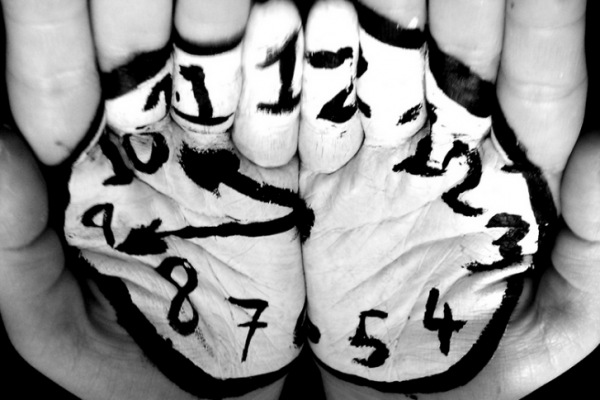
6 Myths That Cause Us To Spend Less Time With Our Kids
‘My dad was a ghost in my home.’
These are the haunting words of a young father I chatted to a few weeks ago. I met him as we watched our little kids at a restaurant’s play-section. He was on holiday and it was my day off. Julie was drinking a flat white nearby, and I was on twin-duty.
I mentioned that every Tuesday morning Julie and I go on a date, and take these little ones with us – and had done so with the older kids too.
I honestly wasn’t trying to impress him, but I clearly had. He gasped, ‘You’re amazing parents. My life would be so different if I grew up like that.’
I asked him what he meant. ‘I don’t remember my dad as a child,’ he sighed. ‘Leaving home everyday before I woke up, coming home late, working on weekends at his desk, and always traveling. I think of my father as the family ghost – appearing now and then, but never really there, certainly not when I needed him.’
The pain in his eyes stabbed me. For the simple reason that I feel the same ghost-like pull to be consumed by work at the neglect of all other relationships – a wiring that I have to fight off by rehearsing the kinds of reasons for being with my kids that I mentioned in a previous blog.
That said, I am guessing that his father never set out to be a family ghost. I speculate that he made the fateful mistake of believing 1 or more of these 6 all-too-common myths:
Myth 1: Time with our kids is unproductive.
I am by nature ‘an achiever’. I derive a kick every-time I get something done. Us parents often feel a little like the Emperor penguin with the egg on his feet. Hanging out with kids, we feel like nothing seems to be getting done.
When Julie was very pregnant and hardly mobile, she’d complain, ‘I feel like a sloth – I’m achieving nothing’. I’d say, ‘You have never been more productive – you’re making a human that will outlive us!’
Our culture doesn’t help our impatience one iota. It teaches us – especially men – that our success is defined and proved by our career. Oh, we give lip service to how important our families are. But our actions speak louder than our words. ‘Results’ come faster when we leave the eggs at home and get some stuff done – make money, close a deal, or run 20ks to train for that marathon.
And when we have talents and abilities, we’re easy prey: ‘There will soon be some reshuffling in the ranks. We’re looking for a person who has proved themselves in sales, and has shown their dedication to this company. We think you’re it. It will involve more pay, and more hours.’
This is a compliment and opportunity of course. But too often our thirst for approval blinds us to the less time this means we will have for our families.
The problem is that kids are not mainly impressed by our achievements and medals, or the fancier car our higher income can now afford our family. What impacts them is our love (spelt T-I-M-E) – our interest and attention. Us parents, like the Emperor penguin might be seriously slowed down but the warmth and closeness only our presence can bring, is the best environment in which a nascent life can flourish in its formative development.
Myth 2: There’s still a ton of time to enjoy with our kids.
Most of us decide we’re going to spend time with our kids later – later this week, later this term, later this year.
Families who don’t prioritize time for each other never explicitly put it like that. It’s just that life goes by a day at a time. Since there’s always tomorrow, the problem never seems critical.
I remember Fynn at age 5 harassing me: ‘Dad, let’s go swimming now.’ I had a lot on, so I said, ‘Today I can’t – tomorrow, okay.’
But in that moment I suddenly had a 10 year flash-forward. I saw myself harassing a 15-year old: ‘Fynn, let’s swim now.’ He retorted, ‘Today I can’t – tomorrow, okay.’
Do the maths. 18 years with our kids is only 6570 days. If they’re 10, you only have 2930 left. But the most sobering thing is this:
The older they get the less hours you spend with them every week.
A friend of mine calculated that if we add all the hours we will spend with our children in our lifetime, roughly 50% of those hours will be done by the time they’re 9!
In Max Lucado’s ‘The Angels were silent’ he pulls no punches: ‘’Some day’ will never come! The price of constantly delaying in the name of practicality is higher than extravagance. But the rewards of grab-the-moment love are always greater than its cost. So, go to the effort. Invest the time. Write the letter. Make the apology. Do it. The seized opportunity renders joy. The neglected brings regret.’
Myth 3: As it is, I spend plenty of time with my kids.
We’re under the illusion we spend more time with them than we do.
Sure, being in the same room or car as them counts for something, but how much time do we spend in focused attention on each of our kids?
This is what my friend, JP Kloppers set out to calculate. He sent me detailed calculations listing hours spent at work, in travel, asleep, at home, with spouse, with kids generally, with kids in a focused manner. He then honed in on ages 25-65. And this is what he found…
In our working years, on average, us men spend 10% of our overall time at home or with family, but we spend (you ready for this?) less than 1% of our hours in actual personal engagement with a child. Compare that with the amount of time we spend working – 73%!
(By the way, the reason I trust his calculations is that his company Brandseye are also the only social media analysts who predicted both Trump and Brexit.)
Myth 4: My bread-winning justifies my absence from my kids.
Yesterday, my friend told me that her dad, soon after she got pregnant, said to her, ‘My biggest regret is that I spent so much time working for the family, but – as a result – so little time with my family. But I promise to make it up with my grand-kids.’
I smiled, but she didn’t. She continued, ‘He died a month later.’
One of the shocking things about many ancient tribes is that they would sacrifice their children on the altars of their gods. But as I look around, I realize not much has changed – we now sacrifice the well-being of our kids on the altar of our career success. Only we don’t call it worship. We call it ‘bread-winning’.
I realize I need to tread sensitively here.
Julie and I know how expensive kids are. I know how hard both of us have to work to feed and educate them. We’re both bone-tired by 5pm every day.
I especially think of single parents. My mom would work whole days just to have enough money to feed Ryan and I a decent plate of food – and often she’d eat our leftovers and some bread. Honest. Her love is indelibly impressed upon me.
I guess I’m saying that, unless we are in exceptional circumstances (like my mother was) we might need to be willing to earn less money so we can spend more time.
If you do the long-term happiness trajectory of their lives, it is much better for children to live in a smaller home, drive in a less fancy car, have less mind-blowing holidays, and even a less sterling education than have them live in a big haunted house with a ghost for a dad or mom.
Myth 5: Parents can jol long and hard, and still make kids feel loved.
It’s not just work that competes with our kids. It’s good times. That’s what a counsellor/teacher helped me understand the other day.
She works in a high school with learners from mainly high net-worth families. I asked her what the issues were that she encounters in these teens. She mentioned eating disorders, drugs, promiscuity, depression and the like, but then became even more serious, ‘I’ve discovered there’s a recurring root cause behind these – parents are not spending enough focused time with their kids. The teens I talk to feel neglected.’
Automatically sympathizing with the parents, I asked if it was because of how long and hard they were working. Her answer completely surprised me: ‘No, it’s because of how long and hard the parents are partying.’
I was perplexed. Articulate teacher that she is, she elucidated further:
‘Too many parents don’t understand that the only way to bring up whole and happy kids is to deny themselves, not indulge themselves. Too many parents seem to have bought into a self-fulfillment ethic. They’re trying to have it all, raise happy kids and party as hard as they did in their twenties.’
‘Unfortunately, their wealth makes babysitters and child-care easy enough to afford, helping them get away to Africa Burn or another event or party – one jol after another.’
‘Also, the last material gift they’ve given to their child placates their conscience, because surely, they reason, that’s proof they love their kids. But the kids I talk to don’t need satiating presents from their parents. What they need is the securing presence of their parents.’
‘This requires some self-denial, which is so often in short supply in those families where everything else is in vast supply.’
Having quoted her, I am not saying that parents never get away from their kids nor have a good time. (Or surf – I keep telling Julie that one surf makes me a better dad and hubby for the next few days. Ha ha.)
What I am saying is that if our kids are going to become all they can become, it’s partly because we do less than half of everything we’d like to do.
Myth 6: Time with my kids doesn’t seem to benefit them that much.
Our kids seldom say it, and we forget this, but time with us is worth gold to them. Let me make this point with 2 stories, one factual and the other… well, I know someone who knows someone that this happened to.
First story: Charles Francis Adams, an American president’s son who followed his dad’s political trail, read through his deceased father’s journal. One entry pierced him: ‘Went fishing with my son today – a day wasted.’
Charles then read his own diary entry for the same day, and found these words: ‘Finally, went fishing with my dad today – the best day ever.’
Here’s the other story. A dad came home from work, tired. ‘Daddy, can I ask you a question?’ The man nodded to his 11-year-old daughter. ‘How much money do you make an hour?’
‘Um. About 500 bucks.’
She bowed her head for a few seconds. Looking up, she said hopefully, ‘Dad, may I borrow 100 bucks?’
‘No!’ he shot back, ‘You have to wait until you get pocket money!’
Shoulders slumped, the little girl made her way to her room. Minutes later the father wondered why she was so sad, and what she might need money for. He went to her room. ‘Sorry honey. I had a hard day and I took it out on you. Here’s that 100.’
She sat straight up, beaming. ‘Oh thank you, Daddy!’ She reached under her pillow out some crumpled-up notes. ‘Now, I have enough! Daddy, here’s 500! Can I have an hour of your time?’
Ouch.
The bottom line?
Don’t be a ghost, leaving a life-long void in the heart of your child. Rather be a presence, and you will inject a life-long substance into their interior.
Enjoy the egg on your feet. It won’t be there forever. If they’re still small, love the fact that your kids shout, ‘Mom’s home’ or ‘Dad’s home’. Feel those rugrats tightly hug their arms around your legs while you drag them step-by-step across the lounge.
They won’t be doing that for very long.
An old man looking back on his life, RT Kendal laments: ‘Oh how I wish I could have a second chance to spend more time with my children. To read with them, to play with them, to tell stories to them. To cry with them when they were hurting. I write these lines to emphasize this matter again with the hope of saving some younger person’s family.’
Much like the baby penguin forming in that egg, our children’s long-term happiness and wholeness hinges on us simplifying our lives. On our self-denial. On our slowing down. On our being there – not just for them, but with them.
Like I said in my first post in this series, I am not trying to guilt trip anyone. Instead I hope to sober and spur us on to be the great parents our great kids deserve.
If you’re ready to make some changes, you’ll be glad to know that my next post will get super-practical as it answers, How do I spend more time with my kids?
Comments
Also published on Medium.




